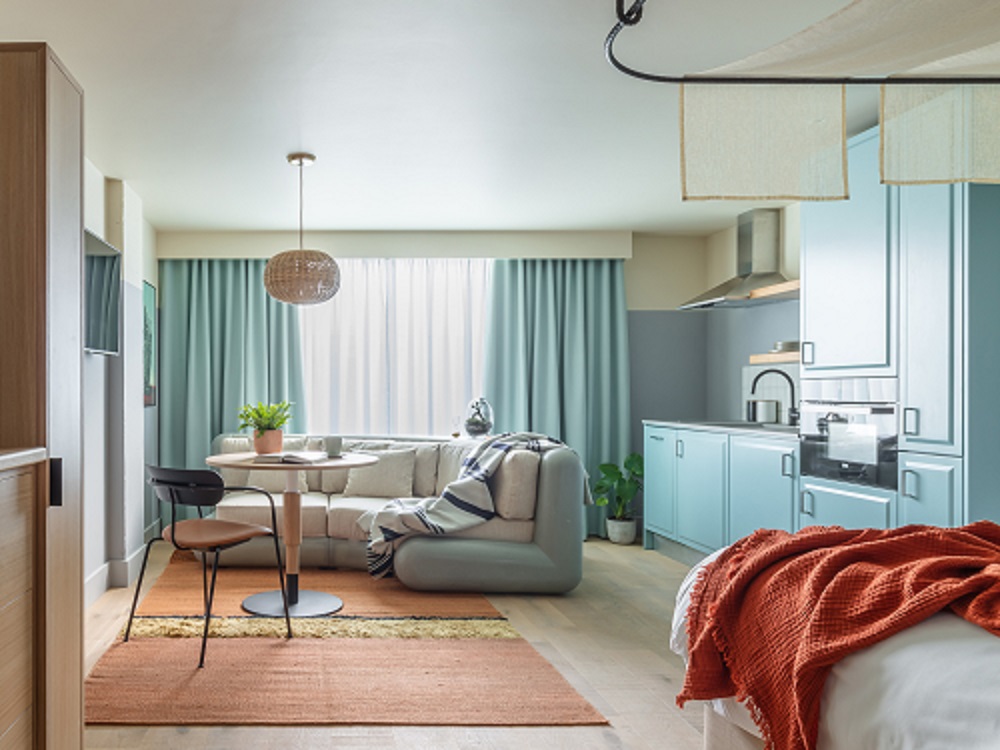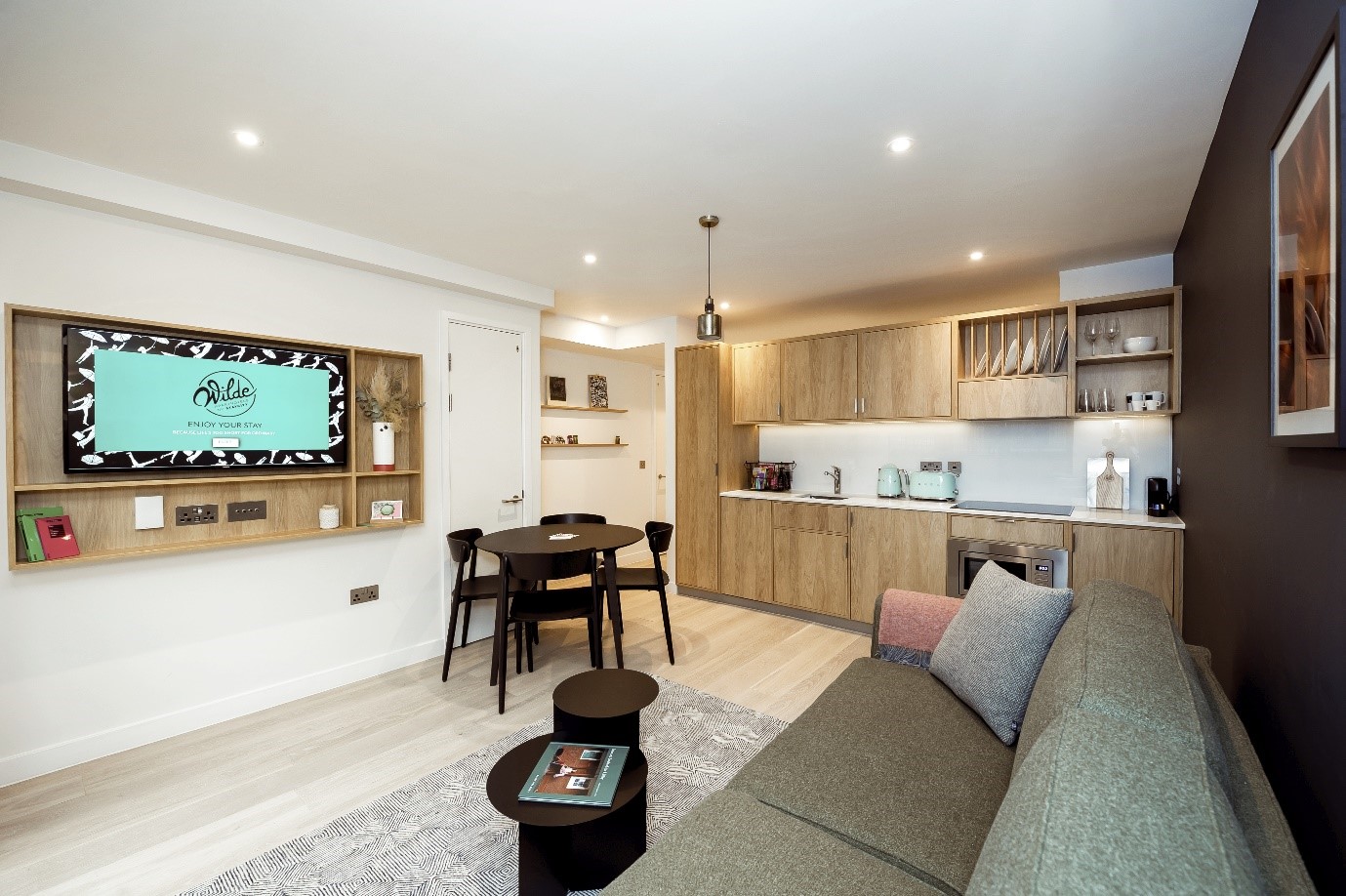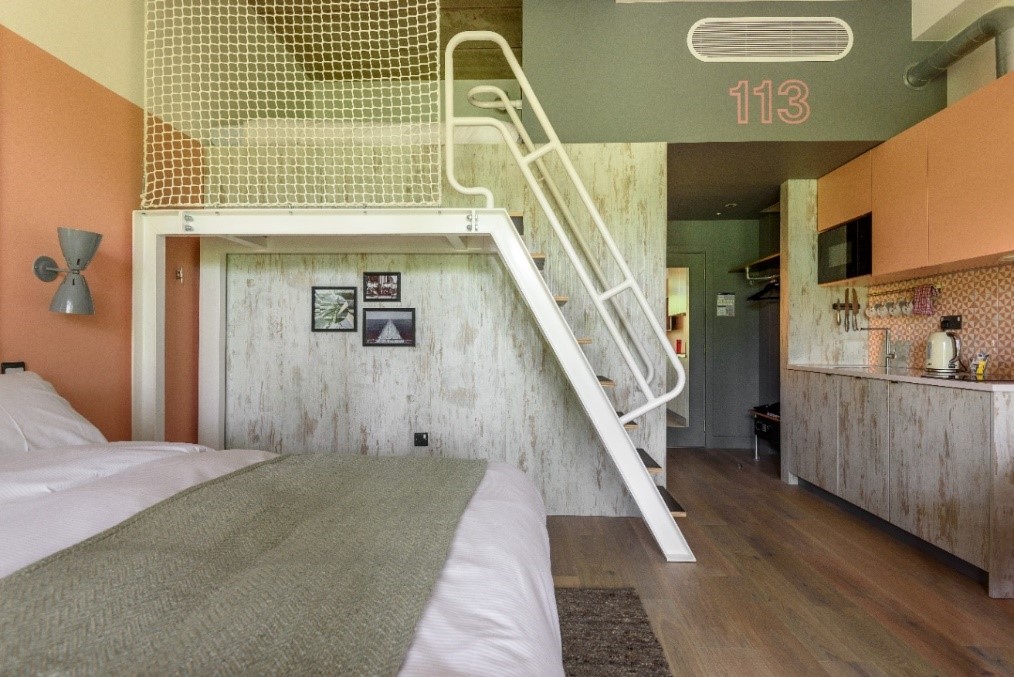Advantages of the Extended-Stay sector proven during the global crisis
With a significant proportion of Serviced Apartments and Aparthotels remaining open during the Covid-19 national lockdown, the sector has proven its resilience during a global crisis.
12 minutes to read
Following interviews with a number of leading operators, Knight Frank explores the lessons learned and the strategies in place, to help cushion the ongoing impact of Covid-19 as the pandemic continues to evolve.
We outline 5 key success factors, which will in time determine how successful an operator has managed the challenging operating environment.
- Trust and confidence in the product and operating standards.
- Ability to react quickly – versatility & flexibility of the business model.
- Re-strategize - reducing risk and volatility.
- Lean and lighter business models.
- Commitment and trust in the long term vision.
In recent times, growth of the sector has prospered through the development of niche brands, which offer modern, welcoming, social spaces, combined with a product that provides comfort, practicality, safety, flexibility and space.
At a time of mass disruption and demand shocks in the hospitality sector, it is the fundamentals of the core product, which has proven the sector’s resilience. Critically, operators have been able to actively target a diverse mix of guests with a long-stay requirement, in need of self-contained, safe and secure accommodation, underpinned by accredited standards of hygiene.

Bermonds Locke, Tower Bridge, London – Edyn Group, Opened September 2020
Trust and confidence in the product and operating standards
"More than just a space to sleep, Your place. To stay, to live, to be. Feel Free."
Locke
≈≈≈≈
"Flexible living environments that don’t force you to conform to a set of rules, it’s somewhere you can treat as your own and provides the comfort and freedom of your own home..."
Room2 Hometel
≈≈≈≈
"Room to be Yourself. We offer spacious city centre aparthotels designed to make you feel at home.”
Roomzzz
Clear marketing messages of various specialist operators portray the confidence of the product offering, yet there is no better opportunity than a health pandemic restricting people’s freedom to move, which truly reinforces this message and highlights the value of a serviced apartment/aparthotel model.
With most assets continuing to trade throughout the lockdown, Covid-secure measures and strict hygiene practices were quickly implemented, combined with technical solutions such as contactless check-in and hands-free access to buildings being implemented, in timeframes that would normally extend to many months or years. In recent times, consumers have become increasingly discerning in their choice of products and services, prioritising flexibility, value and quality. Following the health pandemic, choosing a self-contained apartment will become increasingly of high priority, with corporate booking agents in particular expected to choose recognised brands, due to the high level of brands standards imposed with respect to hygiene and operational controls.
Together with the accreditation to ASAP (the association of serviced apartment providers), which ensures strict compliance of legal, health and safety requirements and good practice, the sector has an opportunity to gain greater acceptance as an alternative proposition to that of a traditional hotel or indeed an AirBnB stay. In fact, certain operators, such as the Edyn Group, which operate the SACO brand and the design-led Locke aparthotels, have seen an increase in demand from the AirBnB distribution platform, as demand heightens for self-contained, spacious accommodation with the safety and security of a professional operator.
As such, the sector is likely to become a far more recognised choice for guests, due to the versatility and flexibility of the product. Furthermore, investors are likely to show strong appetite for a flexible business model, proven to be resilient and withstand volatility in the marketplace, and underpinned by strong management.

Wilde Aparthotels by Staycity, Edinburgh
Ability to react quickly – versatility & flexibility of the business model
Resilience has stemmed from each operator’s ability to pivot the business model, reaching out and successfully targeting a different mix of business.
Having a base of long-stay business and able to accommodate essential workers, meant that for a large number of operators, a significant number of properties were able to remain open during the lockdown. Despite the sudden and abrupt loss of transient business, the ability to continue to trade and flex the model, to attract a significantly greater proportion of long-stay guests, has allowed for fixed costs to be covered and to achieve break-even on GOP as a minimum.
Where possible, operators were able to consolidate occupancy, freeing up inventory to capture new markets, undertaking bold and decisive action to change strategy where appropriate. On occasions, entire buildings, with C3 planning use, have been temporarily repurposed to the private rental sector, with strong demand for cheaper Assured Shorthold Tenancy contracts. Meanwhile, other properties have been partially or wholly used to house the homeless or individuals placed by local authorities during the lockdown period. Depending upon location, particularly in London, certain properties are still actively being contracted out on this basis.
"As the lockdown arrived, the team had to learn really quickly to adapt to working at a time of crisis, for both our long term residents and those key workers seeking a safe haven. We truly demonstrated the real value of flexibility and resilience in serviced apartments for all our guests and residents at the most difficult time."
Robert Alley, Roomzzz, Chief Operating Officer
Re-strategize - reducing risk and volatility
With continued global restrictions on travel and the absence of overseas visitors, the focus on driving domestic local and national business is pivotal. These are far from normal trading conditions, with the absence of regular, repeat corporate business and the disappearance of key sporting, musical and leisure demand drivers.
Driving staycation leisure business and attracting families during school holidays is essential during this current downturn, but going back to the roots of the serviced apartment sector, securing relocation and project business is deemed critical to ensuring a much wider base of long-stay corporate demand.
A different type of corporate guest is also emerging. Demand from clients needing to quarantine or isolate away from families; people needing to relocate and find a temporary home on a monthly rolling contract, with no need for a deposit or references; individuals with new flexi work patterns, and with permanent office space decreasing as offices downsize, this generates additional demand within the serviced apartment / aparthotel sector, boosted further with its co-working and co-living appeal.
Reports of respectable occupancy levels throughout the lockdown period were recorded by all operators, with occupancy levels typically averaging between 65% and 75%. A surge in trading, as a result of exceptionally strong staycation demand throughout the summer months, led to even greater trading performance. Assets in markets such as Stratford, York, Chester and Liverpool reported exceptionally strong occupancy levels, achieving occupancy between 85% and 95%.
With the mix of long-stay residents increasing, this has negatively impacted on the average rate achieved per apartment, resulting in a decline in RevPAR. Whilst forecasting at this time is exceptionally difficult, as the pandemic continues to evolve, the sector anticipates a possible RevPAR decline in the region of 35%-40% for the full year 2020, compared to the previous year.
"We are encouraged by recent trading performance, with occupancy levels currently exceeding our expectations based on our revised forecast at the start of the imposed lockdown. Bookings are starting to rise across our European estate as guests demonstrate their confidence in our properties and brand."
Jason Delany, Staycity Group, Director of Brand, Product & Marketing
Lean and lighter business models
Controlling the pandemic via social distancing measures, has brought into acute focus the delivery of everyday normal services provided within the wider hospitality sector. As such, limiting services such as reduced housekeeping during a guest’s stay, closing public spaces to non-residents and a reduced F&B offering have all actually resulted in significant operational savings.
Changes to the business mix, with an increase in long-stay guests, has further facilitated operating efficiencies, with significantly less administration costs due to fewer guests and minimal housekeeping costs. Put into context, payroll efficiencies have been achieved off the back of an already lean model, which in a normalised trading period, total payroll costs would typically equate to between 12%-15% of turnover, (this compares to a traditional hotel with total payroll costs of around 28-30%).
A second major cost saving has come from substantially reduced commissions payable to OTAs, as a result of the dearth in transient business. Meanwhile, long-stay guests over 28 days results in reduced VAT rates payable, falling to 1% (20% of the base rate), under the current reduced VAT rates payable. In addition, government support through the Job Retention Scheme and the business rates relief have provided further temporary support.

HomeTel, Room 2 - Southampton
Commitment and trust in the long term vision
Prior to the pandemic, the sector has been known for being highly fragmented, with numerous small, independent players and represented by only a few sizeable branded operators. The deeper and longer the economic downturn, the greater the impact anticipated on current supply levels. Whilst the pandemic will be a catalyst for the market to naturally readjust, increased opportunity exists for innovation, expansion, and consolidation of existing brands, along with the possibility of new entrants from the larger global hotel brands.
"We always believed and advocated that extended stay hotels have advantage during crisis, and this pandemic has fundamentally proven this point. Whilst all other accommodation types have endured closures, our extended stay hotels remained open, and most of them performed at or above breakeven level. Our extended stay pipeline of some 600 internationally branded suites, opening in Europe within the next six months, is testament to our long-term belief and commitment to this segment."
Asli Kutlucan, Chief Development Officer, Cycas Hospitality
Prior to the COVID-19 pandemic, the serviced apartment / aparthotel sector witnessed the largest year-on-year growth in supply of all UK serviced accommodation. In 2019 some 1,400 new apartments opened, representing supply growth of 5.8%, and prior to the outbreak of the pandemic equally strong growth in supply was planned for 2020.
Appreciating the severity of the downturn, the pandemic has undoubtedly delayed certain projects. Yet a strong pipeline of new supply, currently under development, is still anticipated to open. Staycity Group have an additional 600 apartments planned to open in the UK by the end of 2021, with two Wilde Aparthotels by Staycity planned to open in London and a second Staycity Aparthotel planned to open in Manchester.
The Edyn Group, committed to the rollout of their boutique Locke aparthotel brand, are on an active acquisition path, growing the brand by a further 550 apartments by the year-end, with openings in Cambridge and Dalston in north-east London, together with an 103-unit extension to their Aldgate property. In addition they plan to open and additional 1,500 units in 2021 and a further 1,000 in 2022/23.
Cycas Hospitality, meanwhile will open the 92-suite Residence Inn Slough in early 2021 and Roomzzz are extending their national reach into Scotland, with the opening of the 75-aparthotel Roomzzz Edinburgh. The Cheval Collection, meanwhile, have expanded during the pandemic, adding 100 new Residences to their collection, with the opening of two new properties in Edinburgh - Cheval Edinburgh Grand and Cheval Old Town Chambers.
The Lamington Group, has adjusted their hometel Room2 model to develop the sub-brand Room2 lite, created to tap into the budget hotel sector, by engaging in a model of hybrid leases. The group is currently in advanced negotiations with Travelodge landlords, with the aim to convert between five to fifteen such hotels into Room2 lite properties.
"The hometel model has proven its immense resilience during unprecedented times. The performance under the most testing of conditions underpins our confidence to stick to our long term strategy, to deliver 5,000 keys under the room2 and room2 lite hometel brands across the UK."
Robert Godwin, Managing Director, Lamington Group
Knight Frank View
Under normal trading conditions, the lean business model of the serviced apartment/aparthotel model, with limited food & beverage offering and a high yielding accommodation business, generates a much higher GOP than traditional hotels, often in the range of 55% to 65%. At a time of operational survival, with new strategies in place, performance may be trading significantly below budget, but importantly they remain profitable; credible operators will in time look back on the pandemic as a period of great learning and how to operate profitably in a period of extended crisis.
Having confidence in the product and the business model will ensure that no rushed long-term decisions are made at a time of depressed trading, at the bottom of the cycle. Certain growth strategies may well be curtailed over time and strategic goals revised or extended, but overall the serviced apartment/aparthotel sector is well placed to take advantage of the opportunities, with the specialist, most innovative operators positioned to reap the greatest rewards.
In an era post Covid-19, as the sector continues to evolve and be driven by the consumer, the homestay holiday-let market served by the Airbnb model, is likely to become less competitive. Customers will increasingly undertake more due diligence in their choice of accommodation, seeking out self-contained, spacious accommodation provided by a specialist branded operator, which guarantees high standards of hygiene and cleanliness.
The resilience and flexibility of the sector during a time of crisis, is likely to properly focus investors’ attention on the sector. As investors seek to shift their exposure to alternative sectors, serviced apartments and aparthotels are expected to join the asset classes of build-to-rent, healthcare, senior living and the private-rental-sector, which are increasingly viewed upon as defensive asset classes.
Knight Frank would like to thank all of our contributors for their generous time and support.
Our thanks to:
Cheval Properties - George Westwell, CEO
Cycas Hospitality - Asli Kutlucan, Chief Development Officer
Edyn Group - Eric Jafari, Chief Development Officer
Lamington Group - Robert Godwin, Managing Director
Roomzzz - Robert Alley, Chief Operating Officer
Staycity Group - Jason Delany, Director of Brand, Product & Marketing
Knight Frank Contacts: